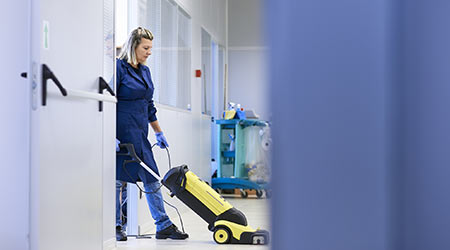
I responded in an earlier article to a writer asking about an “ideal, one size fits all” estimator and expressed that in my opinion, none probably existed although there are some very good products on the market. I do not endorse specific products so am offering some basic guidelines that I hope will be of assistance in your arriving at a realistic bid.
I like to divide equipment into at least two major categories: Major and Minor. Although I have touched on this subject before I want to bring it into context of this series on Bidding Elements. One key point to realize is that the larger the facility, the greater the need for dependable equipment that has proven to be productive. In this case, you need a vendor/distributor that not only understands your needs but also understands the limitations of the equipment you are purchasing.
I remember a BSC (building service contractor) who demanded the “most efficient” piece of equipment. All they really needed was a good back pack vacuum cleaner for the area being serviced. The inexperienced representative referenced the data base and suggested a very expensive piece of equipment solely on its productivity (per square foot) without taking into account other key factors. He did not visit the site so was simply responding the buyer’s request or ask how many square feet was involved: 4,500 total. All was well, until a 42” wide rider was delivered to the site which was a very tight office space full of cubicles. Although the unit could get into the account, it could not fit between the tight cubicles.
I define major equipment as costing over $1,000.00 and can be depreciated over a five year period. Although there are exceptions to this rule, major equipment is going to include high end buffers and burnishers, riding units, large HWE’s (hot water extractors) and other high productivity units that are designed for large spaces.
I define minor equipment as items ranging from $250.00 - $1,000.00 and can include back packs, upright units and other systems. Many people depreciate these units over a three year period but it is best to consult with an accountant as to how to handle such costs.
Your equipment costs are very important in that you should be purchasing the best fit to accomplish the task.
Your comments and feedback are always appreciated. I hope to hear from you soon. Until then, keep it clean...
Mickey Crowe has been involved in the industry for over 35 years. He is a trainer, speaker and consultant. You can reach Mickey at 678-314-2171 or CTCG50@comcast.net.
posted on 6/30/2017

 The Down and Dirty on Cleaning in Virus Season
The Down and Dirty on Cleaning in Virus Season How Surfactant Use is Expanding in Commercial Cleaning
How Surfactant Use is Expanding in Commercial Cleaning Maximize Your Margins: Learn How to Automate Pricing and Track Rebates
Maximize Your Margins: Learn How to Automate Pricing and Track Rebates